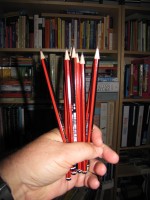Why is my writing chair all wonky?
My office chair has suddenly gone all wonky.
If I lean only slightly to one way, it wants to go further. It’s quite disconcerting, especially when I am concentrating on my latest literary masterpiece. It has the effect of throwing me not only off balance slightly, but it also takes my focus off my writing. Not good.
My wife insisted I buy a really good “writing chair” for my office when I retired from teaching nearly seven years ago. (Is it really? How time flies when one is busy writing.) So I bought this great chair and it has endured nearly ten thousand hours of me sitting here grinding out literally one and half million words (yes – I do keep such records).
Poor thing. It probably needs to retire gracefully. Trouble is, I feel I am just getting under way with this writing thing. My best words are still coming. And I don’t want to go searching for a replacement.
I’ve turned the chair unceremoniously upside down a few times trying to work out how to fix it. Mmmm – seems there is nothing to adjust, tighten, loosen, fix or correct. Ah – there is a tension knob – a few twists of it seems to have improved it somewhat.
Why is my writing all wonky?
Sadly, this also happens with the words we write. A poem or a story or parts of a novel are all “wonky”. They need very close inspection to see if something is wrong. Only when the “wonky bit” is fixed will the story or poem work properly. Sometimes you can’t see it yourself, so it’s good to have another set of eyes to have a look at it. A critiqing group can also give good feedback.
Good writing.
Hand me a (poetic) pencil
I love pencils.
I always have a good supply of 2B pencils on my desk, and a back up supply in the drawer of my desk. I love the feel of a pencil in my hand as I write. This is especially so when writing poetry.
I almost always use a 2B pencil when composing poems. The sensuality of holding a pencil generates a creativity I rarely get using a pen or a keyboard. After the poem is crafted and has morphed through several drafts, a final copy is then typed up on my computer. Very little changes once I’ve typed it, perhaps only a little formatting and minimal changes to punctuation.
For most of other writing I now use the computer keyboard exclusively. This includes stories, novels, essays, articles and blog posts. I just do not have the time (or the patience) to compose in pencil or pen first. I may occasionally jot down notes or an outline in pen or pencil, but I’ve also done that on the computer. It’s a necessary part of being productive.
What do my readers use when writing?
I’d be interested in hearing your comments.
Good writing.
My latest writing endeavours
My regular readers would be aware that over the last few years I have been very busy working on my Master of Arts Creative writing degree. I finished the requirements for this last December and submitted my thesis paper for marking. I am still waiting for the results from the examiners.
Over Christmas and New Year I took a few weeks’ break from the intensive writing I did in the latter half of 2010. It certainly drained me emotionally and physically. Now I am steadily getting on with other writing projects. Most writers I know or have read recommend that once you have finished a major writing project, have a short break then get on with the next project. This is especially true if you have submitted a book manuscript to a publisher.
I haven’t yet submitted my thesis paper (a children’s novel) to a publisher, but submitting it to the examiners is similar, I guess. I could spend every day sitting by the phone waiting for a call from my supervising lecturer telling me of the result. That wouldn’t achieve anything, nor will it hasten the process. I will hear in due course, probably in the next 3 or 4 weeks. In the meantime, I’m getting on with other projects.
Some writers make the mistake of sitting by the letter box, or checking it every few hours, waiting for a letter from their potential publisher. That will not make an acceptance (or rejection) letter come any faster. Get on with the next project while you are waiting.
So – how am I using my time?
- Birding: I’ve been doing a little birding which is my favourite hobby. You can read about it on my blog called Trevor’s Birding. This site shows hundreds of photos of our beautiful Australian birds.
- Photography: I’ve just treated myself to a new camera and I’m having fun playing with it. Over coming months you’ll see the results here and on my other two sites.
- Reading: I’m aware of the ever increasing heights of the piles of unread books and magazines in my office and bedside table, and I’ve been steadily working my way through them. My reading during my studies was very focussed on what I had to read, not what I wanted to read. That will change.
- Swimming: Now that the weather has improved here in South Australia I’ve been making good use of our swimming pool. Having a solar blanket heats the water to very acceptable temperatures, even first thing in the morning.
- Writing: My writing has not been totally neglected, and after the Christmas break I’m steadily getting back into it. At the moment I am concentrating on writing articles for my web sites. I’ve written many of them for my birding site mentioned above, as well as for another site called Trevor’s Travels. This one is about my travels here in Australia and overseas. Then I am planning a series of articles for this site about writing, so stay tuned.
Sounds like my holiday is over and I’m back to writing again.
Good writing.
It is never too late to be a writer
“It’s never too late to be what you could have been.” George Eliot
Do you want to be a writer?
I have – ever since I was eight years old. I dabbled in writing stories and poems in high school but then became sidetracked in teaching for 35 years. Teaching was always my second choice. All through my teaching career – a reasonably successful one I might add – I continued to consider myself a writer but could only devote serious time to it during holiday periods.
My writing received quite a boost when I bought my first computer in the late 1980s. All through the 1990s I built up a considerable body of writing and had limited publishing successes. I always considered that I would begin to write full time and very seriously when I retired. In part, I have succeeded in that goal. For the last six years I’ve written thousands of articles on my three blog sites. I’ve also written many short stories, poems and a novel for children.
The point of all this?
I agree with the Eliot quote above. Last month I celebrated my 63rd birthday. I’ve just completed the requirements for my Master of Arts Creative Writing degree. The novel I’ve just written will be submitted to publishers in the new year. My best writing years are still ahead of me. It is never too late.
Five years ago I would have scoffed at the idea of having a university degree. It is never too late.
Five years ago I wouldn’t have dreamed of writing so much, but now I’ve written nearly two and a half million words. It is never too late.
Five years ago I could only dream of making money from my writing, but now have a steady income from my writing, especially blogging. It is never too late.
Five years ago I had very few readers but now hundred of people around the globe read my words every day. It is never too late.
Good writing: it is never too late to become a writer.
Checking my novel
Over recent weeks I have been rewriting my novel for children.
It is now in its 8th draft in which I changed from the third person to the first person. So far, so good. I think it has been worth the effort. While I was at it, I made some significant changes to many phrases and sentences, including cutting out whole paragraphs – but also adding quite a few words and phrases here and there. The nett result is an increase of about 500 words over the whole manuscript while at the same time cutting at least a thousand words.
Now this week I am going over the whole manuscript again – this time meticulously. I’m looking for typos, spelling errors, punctuation mistakes, redundancies, and especially the misuse of pronouns, a problem which occurs when one changes point of view. All this editing and checking is wearying but essential.
It is essential because I want this book to be the very best I can do.
Good writing.

